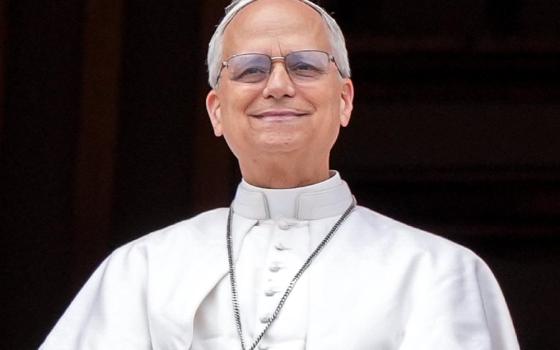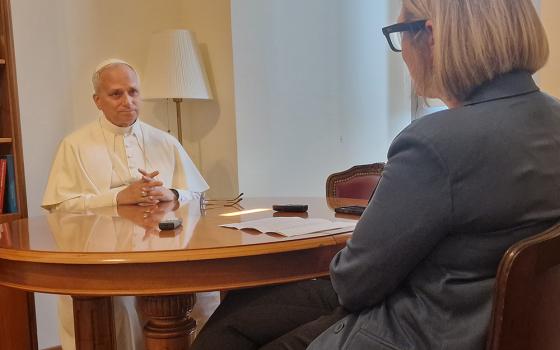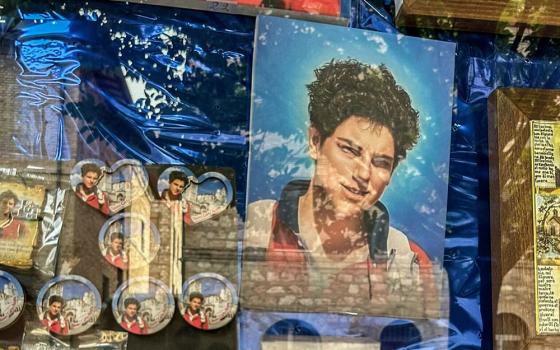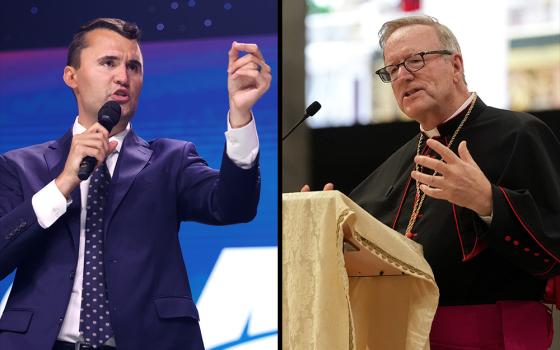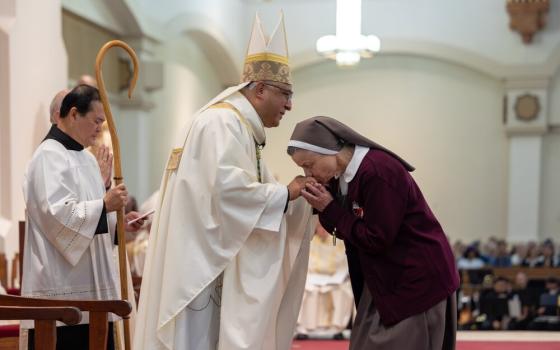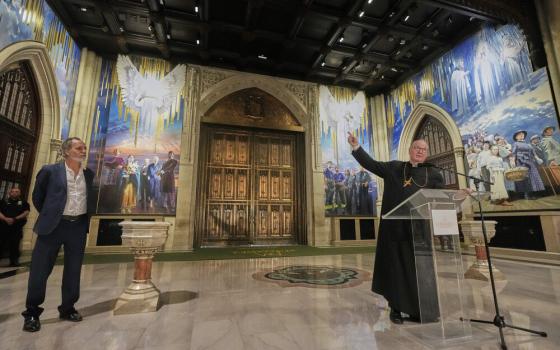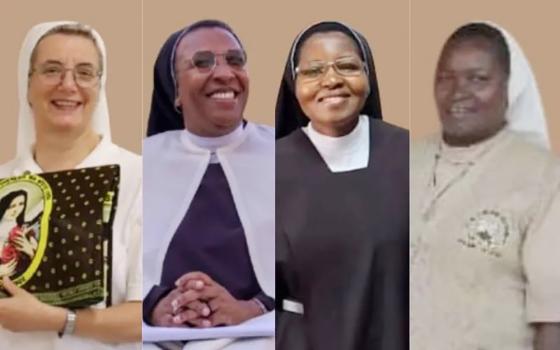Young people use their cellphone lights during a vigil at Orem City Center Park in Utah Sept. 11 after U.S. conservative activist and commentator Charlie Kirk, 31, was fatally shot during a Sept. 10 event at Utah Valley University in Orem. (OSV News/Reuters/Jim Urquhart)
The killing of Charlie Kirk on Sept. 10, is a sobering inflection point in America's descent into political violence. Whether or not one agreed with Kirk's politics, his death diminishes us all. At the end of the day, he was a son, a husband, a father, a citizen, a fellow human being. His violent death reminds us that political violence is not abstract — it is personal, it scars communities and it corrodes the very fabric of our democracy.
Kirk's assassination is not an isolated event. America in 2025 has witnessed an alarming series of attacks rooted in political animus and grievance. In June, Minnesota's former Speaker of the House Melissa Hortman, her husband and their dog were killed, while State Sen. John Hoffman and his wife were gravely wounded in related shootings. In May, two Israeli embassy staffers were gunned down outside the Capital Jewish Museum in Washington, D.C., in what investigators described as an antisemitic and politically motivated crime.
These events come on the heels of a long string of violent episodes that have turned political affiliation into a potential death sentence. To be an elected official, a political activist, or even a visible member of a minority community has become, for many, a mortal risk in the United States of America.
At stake here is not simply the safety of politicians or activists but the very spirit of American democracy. Political violence erodes the common life of the nation by making every disagreement potentially lethal and every encounter with difference a matter of survival. It poisons the wells of civic trust. When political opponents are demonized as enemies of God, or when conspiracy theories are weaponized against entire communities, the result is not vigorous debate but a society living in fear and preparing for combat.
Far too often in decisive moments when the nation needed moral clarity and courageous leadership; the church's voice was often hesitant, divided or compromised.
Moments like these force us to seek moral guidance. Religious communities are often looked to for healing and direction. The pressing question I ask myself as a Catholic priest is this: Can American Catholicism help lead the way toward a different political culture — one not rooted in rage, fear and demonization, but in truth, respect, listening, generous disagreement and Gospel nonviolence?
Faith communities — especially the Catholic Church, with its deep intellectual and social gospel tradition — can play a decisive role in shifting the culture of discourse.
In many African traditions, crossroads are spiritually charged places — sites where a traveler pauses, reflects and reorients before continuing the journey. Crossroads can be places of healing and reconciliation, where sacrifices are left as signs of gratitude and rituals of wisdom are performed. They are places to cast one's gaze beyond immediate short-term gains, to embrace courageous decisions that allow the journey to continue with safety, solidarity and purpose.
This is how I read contemporary American Catholicism as well as American democracy: Both stand at the crossroads.
For the Catholic Church in America, the choice is whether it will align itself with exclusion, extremism and violence, or whether it will live fully the priorities of the Gospel.
For American democracy, the question is whether the country will continue down the divisive path of isolationist politics and the weaponization of Christianity through white Christian nationalism — with its associated projects of exceptionalism, domination and apocalyptic visions — or whether it will rediscover the path of reasoned discourse and civic solidarity.
The Catholic Church has a long intellectual and social gospel tradition that promotes reasoned and responsible dialogue rather than violence. Catholicism affirms that human beings are created with the capacity for reason, that they can work out disagreements through deliberation, and that changes in behavior must begin with changes in thought. Because human beings can discern between good and evil and between love and hatred, coercion and violence are unacceptable substitutes for persuasion. People can only be convinced of truth; they cannot be forced into it.
Political extremism thrives on the opposite premise — that might makes right and intimidation is the quickest path to victory. The Catholic intellectual tradition insists on reasoned discourse, and Catholic social teaching insists on the dignity of every person as the starting point for any political vision. Political violence, therefore, is a betrayal of both faith and reason.
U.S. President Donald Trump appears on "Fox & Friends" Sept. 12, two days after the fatal shooting of conservative activist Charlie Kirk during an event at Utah Valley University in Orem, Utah. (OSV News/Fox & Friends)
Pope Francis in Fratelli Tutti warns against extremism and closed-mindedness, calling instead for a culture of dialogue and Gospel nonviolence. Pope John Paul II in Fides et Ratio emphasizes the indispensable role of reason in moral judgment, urging that human beings, guided by both faith and reason, are capable of discerning truth without coercion. Both converge on the same principle: violence and extremism close the door to truth, while reason, dialogue and respect open the way toward it.
St. Augustine's thought is instructive here. In De Doctrina Christiana, Augustine insists that language is never neutral. Words are signs that point to truth and ultimately to God. Words are meant to delight, instruct and move the heart and mind. But offensive and loathsome words uttered with falsehood or in a disagreeable manner harm people and society hence his warning: "Be it far, far from us, that priests should applaud speakers of iniquity, and God's people love it so. May such madness be far from us, I say; for what shall we do in the time to come?"
When speech is severed from charity — when eloquence becomes a tool to dominate, deceive or humiliate — it no longer builds community but destroys it. For Augustine, the vocation of language is to persuade through reason, clarify reality and direct hearts toward love. Misused words wound communities; rightly used words can heal them.
Yet the current American moment reveals a frightening deterioration of language itself. Words have become weapons, stripped of their capacity to mediate truth or foster mutual understanding or build community. In the rhetoric of both far-right and far-left, one sees a reduction of opponents to caricatures, an endless stream of insults, and a refusal to see others as well-meaning fellow human beings. When language collapses into shouting matches or coded calls for violence, society loses its very capacity to deliberate. When religion is used, as Katherine Stewart demonstrates in The Power Worshippers, to cast fellow Americans as enemies of God because of their political affiliation or positions, violence is reimagined as necessary to rebuild the nation. To recover civil discourse, American Catholics must model a different way of speaking — truthful but charitable, bold but not belligerent.
This alternative is not sentimental but deeply demanding. It calls for adopting what Gary Chapman popularized as "love languages," not as a romantic gimmick but as a civic ethic: speaking in ways that affirm the dignity of others, listening as a form of love, and serving the common good rather than manipulating others for power. When political discourse begins from this posture, opponents are no longer enemies to be destroyed but fellow citizens with whom one shares a fragile common world.
Law enforcement officers work at the crime scene at Utah Valley University where U.S. right-wing activist Charlie Kirk was fatally shot during an event in Orem Sept. 10. (OSV News/Reuters/Jim Urquhart)
There is also an urgent pastoral and civic responsibility here. Priests, bishops and lay leaders must take the lead in renouncing violence explicitly and often, teaching that political disagreement is part of democracy, not a threat to it. Catholic institutions — universities, parishes, schools — must become centers where dialogue is practiced as a form of discipleship, not simply as a technique of conflict resolution. The Eucharist, which makes the many one body, offers the deepest communal ritual and antidote to polarization. In a eucharistic community, there is no room for enemies — only brothers and sisters held together in a bond of communion and friendship as one people. American Catholics who take the Eucharist seriously cannot be comfortable with divisive vitriol, violent rhetoric, much less violent acts.
Yet American Catholicism has often been slow to live up to its own vision. At decisive historical moments, when courage was most needed, the church too often faltered. During the anti-slavery movement, many bishops equivocated or defended the institution rather than stand decisively for human freedom. During the civil rights struggle, the church's official voice came late, often timid and cautious, while Black Catholics and their allies bore the brunt of prophetic witness. In the fight for women's rights, the church retreated into defensiveness, more eager to preserve boundaries than to listen to women's experience. In the face of America's epidemic of gun violence, Catholic leaders have too often remained inconsistent and muted, hesitant to oppose a culture of death that tears families and communities apart. And today, in the face of some of the most extreme policies of the Trump administration — policies that erode democratic norms, stigmatize immigrants weaponize religious symbols, and normalize violent rhetoric — many Catholic leaders remain ambivalent, or worse, align themselves with political power, privilege, access and visibility for short-term advantage.
These failures follow a pattern: privileging narrow claims of orthodoxy and respectability over prophetic witness, seeking legitimacy from elites rather than solidarity with the marginalized, confusing cultural nostalgia and cultural bereavement for Gospel creativity, and remaining complicit in structures of death. For far too often in decisive moments when the nation needed moral clarity and courageous leadership; the church's voice was often hesitant, divided or compromised.
Advertisement
The task now is twofold. First, we must call out political violence with moral clarity and without partisan hesitation. No ideology or party can justify it; no grievance can excuse it. Second, we must take personal responsibility for the way we speak and act. Each careless word that demonizes, each online insult and radicalization that reduces others to stereotypes, and targets contributes to the tinderbox in which violence ignites. Conversely, each word of respect, each act of restraint, each effort to understand another's perspective builds a culture of encounter and respect where violence is less likely to take root.
America is at a crossroads. The path of violence promises only more blood, more fear and the gradual unraveling of democracy. The path of dialogue, reason and Gospel nonviolence is arduous, but it is the only path that can lead to renewal. As Catholics, we are called not only to walk this path ourselves but to invite the nation along it.
In a time when political life seems dominated by fear and rage, the Catholic witness to reasoned discourse, human dignity, a consistent ethic of life and Gospel nonviolence may be one of the last best hopes for the American experiment. American Catholics can apply what they are learning through the practices of synodality to influence American political discourse — to help create a capacious and empowering space where everyone's voice is heard with respect and where people can mutually grow in their understanding of the truth.
